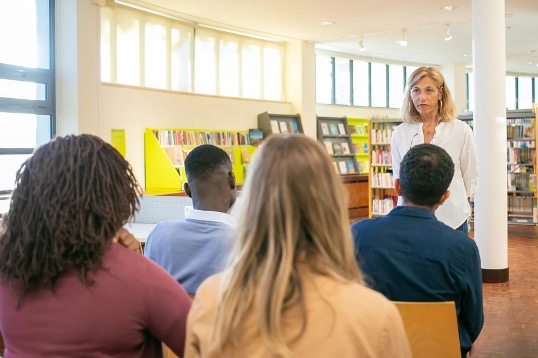 Teachers are all too familiar with how attempts at group work can deteriorate into unfocused social time or a majority of the responsibility being unfairly placed on one conscientious individual, while others slack off.
Teachers are all too familiar with how attempts at group work can deteriorate into unfocused social time or a majority of the responsibility being unfairly placed on one conscientious individual, while others slack off.
Classrooms across the country are filled with situations just like that.
Unfortunately, this is a circumstance that often continues as students enter the workplace.
The cost of unengaged, unfocused, and disconnected workers is alarming.
According to the Bureau of Labor Statistics, U.S. companies lose $3 billion a year to the effects of negative attitudes at work. And the American Management Association reports that 60% of executives listed lack of collaboration as one of their top leadership challenges.
So what can teachers (or managers) do to change this and improve their workplace culture?
The truth is that their solutions are surprisingly similar.
Team Development is a recipe that simply requires the inclusion of five very important ingredients.
If you are an educator, you have most likely attempted group work, or “cooperative learning,” at some point over the recent past. And odds are that it was, while perhaps a welcome diversion from routine, not as impactful as you may have envisioned or hoped.
So which ingredients were you missing that could have made those classes more successful?
HOW DO YOU BUILD TEAMWORK?
Well, here is a short description of the five-part recipe you may want to follow on your next attempt at teamwork:
First, you will want to ensure that there is a clear goal and adequate gear (resources) for the activity or project they will be working on. What is the essential question they will need to answer, or the outcome(s) that you want them to experience?
Next, you will want to have given enough time to build a strong your sense of community. Too many teachers (and managers) underestimate the impact of building rapport and strengthening the relationships and awareness of those who you are asking to work together.
Third, you will want to provide clear expectations and roles for team members, and then continue to encourage them to meet those expectations once the activity has begun. Without establishing expectations, how will you know if they did what they were supposed to? And it is your encouragements and reminders that will serve as fuel for refocusing their efforts if they encounter adversity or frustration.
Fourth, you will want to include some measureable tool for assessing their efforts and attach a consequence for their positive or negative behaviors during the activity. Holding people accountable, and being willing to make adjustments to seating arrangements, groupings, or team roles, are all important to maintaining a sense of professionalism and purpose. If it isn’t important enough to measure, it won’t be important enough for your people to do well.
And the final ingredient you want is to include some element of recognition. What gets rewarded will almost always get repeated, so if you would like certain behaviors to be repeated (or adopted by others) you should offer toasts or celebratory rewards – maybe candy, maybe other perks – to those who did what you desired they would.
You will find that the greatest gift you give those students (or employees) is not the single insight or sense of accomplishment from any one teamwork activity. Instead, the greatest gift you will have given them is the SKILL of working together successfully with others.
Teamwork is an important and learned skill.
Along with the outcomes that your activity offers, you will also have shared with your people a set of valuable skills that they will be able to transfer to other situations they will certainly encounter later in life…
If you are part of the leadership of a school culture that would like to improve the sense of community amongst your staff, the steps for building a more cohesive and successful faculty are almost identical.
You can help to inspire more teacher collaboration and teamwork with this simple, helpful and fun teacher team collaboration tool.
And if you want to have a great time together while building morale, communication skills, and a more cohesive culture, you should consider scheduling a fun team building event for your next staff development day.
A full or half day program of team building for teachers includes challenging activities, powerful insights, and loads of laughter that can serve as a catalyst for improving instruction and creating a far more collaborative campus.
